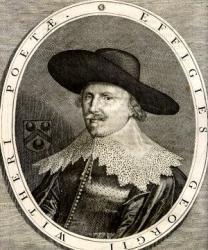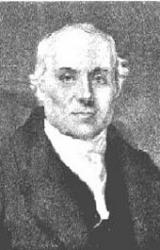
1588 - 1667 Person Name: George Wither, 1588-1667 Author of "The Lord of Heav'n confess" in The Cambridge Hymnal Wither, George, or Wyther—spelled in both ways by himself, the first usually, the second occasionally, e.g. in Prince Henrie's Obsequies (1612), and erroneously Withers, was born on June 11th, 1588, at Bentworth, near Alton, Hampshire. He was the only son of George Wither, of Bentworth. His early education was at the Grammar School of Colemore or Colemere, under its celebrated master; John Greaves. After thorough training and discipline here he was entered in 1604 at Magdalen College, Oxford. His tutor was John Warner, subsequently D.D. and Bishop of Rochester. He had only been three years at the University when malicious and ignorant persons persuaded his father that more learning was not required. And so, as he modestly tells us in his Abuses Stript and Whipt (1613), he was withdrawn "without taking any degree," being now destined, as he moderately puts it, "for the plough," that is, for rustic employment on the paternal estate. This proved utterly uncongenial. He is found next at one of the Inns of Chancery, afterwards at Lincoln's Inn, and intimate with William Browne, the poet, of Britannia's Pastorals. His title-pages from 1617 to 1620 self-describe him as "Gentleman,” and as "of the Societie of Lincoln's Inne" (Fidelia (1617), and 1st Psalme (1620), and Workes (1620)). But Anthony a-Wood informs us:—
"still his geng after things more smooth and delightful, he did at length make himself known to the world (after he had taken several rambles therein) by certain speci¬mens of poetry, which being dispersed in several hands, he became shortly after a public author and most admired by some in that age for his quick advancement in that faculty " (Athenae. Oxon. s. n.).
How uncritical was this miserable criticism, will be understood when it is recalled that amongst these "certain specimens" was the Shepherds Hunting under the first form of "A new song of a young man's opinion of the difference between good and bad women" (Pepysian, ad Percy MS.), Prince Henries Obsequies (1612), Epithalamia (1612), and his stinging and patriotically outspoken Abuses Stript and Whipt. The last drew down upon him the wrath of the monarch (James i.) and nobles, and cast him prisoner into the Marshalsea. Four large editions within a year, and numerous others up to 1622 and continuously onward (exclusive of the reproductions in his Workes) was the answer of the People to the Upper Ten.
While in prison he wrote some of the most delicious of his verse. He likewise composed A Satyre to the King (1615). The wisest fool in Christendom was shrewd enough to perceive that it would be safer to make such a subject a friend than an enemy. He had deftly signed the dedication to the king "his Majesty's most loyall Subiect, and yet Prisoner in the Marshalsey." It procured him his release. From this time onward he was perpetually printing something, now in verse and now in prose, until the aggregate exceeded a hundred of books and pamphlets. There are several fairly accurate enumerations of them, e.g. British Bibliographer, i. 174-205, 305-32,417-40; ii. 17-32,378-91; Sir Egerton Brydges' Censuria and Restituta; Hazlitt's Bibliography (1867). The Spenser Society re¬printed a large portion of the Works in prose and verse; but there was really no editing and no annotation. His successive books are the main facts of Wither's life; yet was he an active member of the nation.
Spite of his hard usage and imprisonments, he was loyal as any cavalier. When Charles i. proceeded to declare and carry war into his native Scotland against the Covenanters in 1639, George Wither served his Majesty as a captain of horse and quarter-master of his regiment under the Earl of Arundel. How sorrowful the wrongheadedness of the king who compelled such a true man as Wither to forsake him and prefer the kingdom to the king, as many others who with pathetic reluctance became Roundheads! In 1641-2 he sold his hereditary estates and raised a troop of horse for the Parliament, in whose army he was promoted to be major. On his colours he carried this motto, Pro Rege, Lege, Grege. Having been taken prisoner by the Royalists, a good-humoured jest of Sir John Denham it is alleged saved his life, to wit, that "his Majesty really must not hang George Wither, for so long as he lives no one will account him [Sir John] the worst poet in England." He was set free. Not long after he was constituted by the Long Parliament a Justice of Peace in quorum for Hampshire, Surrey and Essex. This he held for six years, and afterwards was made by Cromwell Major-General of all the horse and foot in the County of Surrey. On the title-page of his Boni Ominis Votu (1656) in the British Museum there is a contemporary manuscript note, "lately made Master of the Statute Office." At the Restoration he was shamefully dealt with, and by a vote of the Convention Parlia¬ment, was committed to Newgate because of his Vox Vulgi —a noble piece of fiery and idiomatic English, and manly pleading for respect to pipular rights and liberties. For his Prisoner's Plea humbly offered (1661) he was again imprisoned, this time in the Tower. He married (Aubrey informs us) Elizabeth, eldest daughter of H. Emerson of South Lanuk, who, he says, was "a great wit and could write in verse too," and was of the same English Emersons from whom the great American Ralph Waldo Emerson descended. He had issue. He was at liberty when he died on 2nd May, 1667. Aubrey states that he was buried within the east doorway of Savoy Church in the Strand, having apparently lived near it, and either died in the church or in his own house (the phrasing being ambiguous).
James Montgomery, in his admirable Lectures on Poets and Poetry, thus sums up his estimate of him and them:—
"There are scattered throughout his multifarious and very unequal productions, many passages of great beauty and excellence. He was avowedly a Christian poet, though he frequently lost his Christian meekness in the heat of polemics; but his zeal carried with it every evidence of honesty; and he was a sufferer almost to martyrdom, both for his loyalty and his orthodoxy, in the troublous times in which he lived. That he was a poet can never be questioned by any reader who has taste and sensibility enough to understand and enjoy the exquisitely affecting confession of his obligations to the Muse. That he was a Christian will be as little questioned by those who are most extensively acquainted with the character of his religious compositions" (s. n.).
Archbishop Trench, in annotating a charming sacred song entitledVanished Blessing ("No voice which I did more esteem, Than music in her sweetest key," &c), thus annotates:—
"I have detached these two stanzas from a longer poem of which they constitute the only valuable portion[?]. George Wither (‘a most profuse pourer forth of English rhyme,' Philips calls him) was indeed so intolerable a power in verse, so overlaid his good with indifferent or bad, that one may easily forget how real a gift he possessed, and sometimes showed that he possessed" (Household Book of English Poetry, 1865).
Mrs. Masson says of him—"he is remembered now-a-days as pre-eminently the Puritan poet, whose irrepressible Muse made herself hsard even amid the din of civil war" (Three Centuries of English Poetr, p. 375). She quotes his delightful "Christmas" ("So now is come our joyfullest part"), and "Of Poesy" (which Milton did not disdain to utilize), and his "Shall I, wasting in despair." With reference to the "irrepressible Muse" of Wither, it is a felicitous characterisation however regarded, inasmuch as so "irrepressible " was he that he actually set up the types and printed off at least one of his bulkier books. Withers contributions to hymnology are to be found chiefly in the following:—
(a) Exercises Upon the First Psalme......(1620). At the close is a metrical paraphrase of Ecclcsiastes xii. 1-8; (b) Paraphrase on the Creed and the Lord's Prayer (in Workes 1620; separately 1688 and misasserted to be now “first printed“); (c) The Songs of the Old Testament, Translated into English Measures: preserving the Naturall Phrase and genuine Sense of the Holy Text ...... To every Song is added a new and easie Tune.....(1621); (d) The Hymnes and Songs of the Church (1623). This was published Cum Privilegio Regis Begalu . It was reprinted like c.; (e) The Psalmes of David translated as Lyrick Verse, according to the scope of the Original......(1632). Gutch had an autograph manuscript of an alleged different text of the versified Psalmes which passed into the Caesar Library; (f) A Collection of Emblemes, Ancient and Modern, quickened with Metrical Illustrations both Morall and Divine......(1635). This was a special favourite of Elia; (g) Haldviah; or Britans Second Remembrancer, bringing to Remembrance (in praisefull and poenitentiall Hymns, Spirituall Songs, and Morall-Odes......(1641). This was reprinted like c and d; (h) Three Graines of Spiritual Frankincense infused into Three Hymnes of Praise (1651).
It is discreditable to the Church of England, of whom he was a devoted son to the close of his life, and to Nonconformity alike, that many, very many more of his Hymnes and Spiritual Songs have not found their way into their hymnals. A critical yet sympathetic reader would easily find a golden sheaf of musical, and well-wrought sacred song. [Rev. A. B. Grosart, D.D., LL.D.]
-- Excerpts from John Julian, Dictionary of Hymnology (1907)
==================
Wither, G., p. 1289, i. Another of his psalm versions, "The Lord is King, and weareth" (Ps. xciii.), from his The Psalmes of David, &c, 1G32, is in the Hymn Book for the Use of Wellington College, 1902.
--John Julian, Dictionary of Hymnology, New Supplement (1907)
George Wither


 My Starred Hymns
My Starred Hymns



